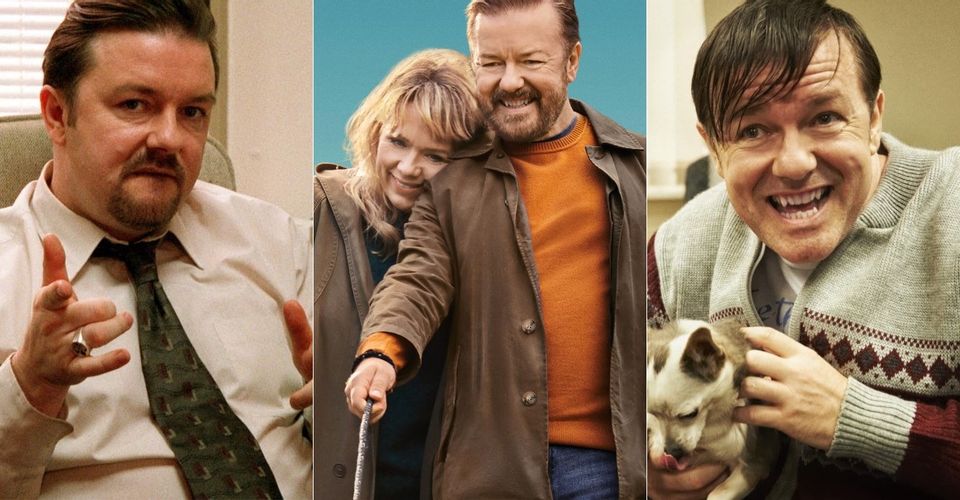Every Ricky Gervais TV Series Ranked Worst To Best

Here’s our ranking of every TV series Ricky Gervais has masterminded. It seems foolish to suggest that any sitcom Ricky Gervais has starred in, written and directed over the years has truly dipped in quality. Every one of the British actor’s TV projects have resonated in one way or another, whether as a comedy, a drama or, as is often the case, a blend of both. Nevertheless, the difference in tone and popularity between each series allows for a degree of comparison between them.
After bursting onto the scene as David Brent (a name many still instinctively use when clamoring to remember the actor’s real name), Gervais became a hot property, first in the UK, and later in the US. Despite both moving into Hollywood and pursuing his successful stand-up career, Gervais has continued to produce British-based sitcoms, usually to widespread critical acclaim. Having penned, directed and fronted his breakout venture, Gervais has largely retained creative control of his own endeavors ever since, sometimes alongside regular partner-in-crime, Stephen Merchant, who is now forging a Hollywood career of his own.
Measuring only Gervais’ various sitcoms unfortunately leaves no room for the hilarious travel docuseries An Idiot Abroad, which stars frequent Gervais collaborator and “head like an orange,” Karl Pilkington. But with season 2 of After Life currently garnering favorable reviews on Netflix, how does Gervais’ latest release rank against past efforts?
Derek

Undoubtedly the most divisive of the Gervais sitcoms, Derek is predominantly set in a small suburban care home for the elderly and strikes a less outright comedic note than viewers might’ve been expecting. As the titular Derek Noakes, Gervais plays a tender-hearted, middle-aged outsider who volunteers at the care home and becomes a loyal friend to the various residents. He’s ably supported by Kerry Godliman’s overworked manager, Hannah, hygiene-shy oddball Kev, and aforementioned “bald twat,” Karl Pilkington, as the home’s caretaker. Less story-focused than other sitcoms, Derek returns to the mockumentary format Gervais helped popularize and studies the broader themes of kindness and mortality with economically-placed gags punctuating those more emotive moments.
Derek’s emphasis on sentimentality disappointed Gervais fans expecting a rerun of his former glories, and Derek attracted a certain degree of controversy due to the portrayal of its lead character, whose exact medical condition is left deliberately vague. With a reputation as an outrageous and near-the-knuckle comic, Gervais’ contemplative and introspective Derek proved to be a jarring shift of gear that viewers either “got” immediately or failed to connect with entirely. Despite some glorious performances and genuinely heartfelt moments, Derek perhaps doesn’t perfect the comedic and dramatic balance Gervais was aiming for, and its moral messages risk feeling a little heavy-handed as a result. Nevertheless, Derek is a very endearing piece that brings the audience onside with a worthy core group of characters and an unapologetically unique approach.
Life’s Too Short

Working alongside Stephen Merchant and Warwick Davis, Life’s Too Short is an underrated entry in Gervais’ catalog and features fictionalized interpretations of Davis, Gervais and Merchant in the lead roles. Arguably an extension of Extras but remolded back into Gervais’ familiar mockumentary style, Life’s Too Short sees Davis struggling to revive his acting career while simultaneously trying to elevate the status of little people in the entertainment industry through his specialized talent agency. Taking in both his personal and professional life, Davis constantly hounds his old pals, Gervais and Merchant, for more work, paving the way for a slew of hilarious celebrity cameos in the cartoonish Extras style. Among the high-profile names to cross Warwick’s path are Johnny Depp, Val Kilmer and Barry from Eastenders.
Continuing Extras‘ satire of the entertainment industry, Life’s Too Short gives an earnest look at the struggles of a small person, both as a celebrity and in everyday life, but balances out those moral leanings by making Warwick so often the architect of his own demise, not dissimilar to a certain ‘friend, boss and entertainer’ over at Wernham-Hogg. Undoubtedly, Warwick Davis is the star of the show and his once-underutilized comic chops are on full display, proving those who only remember the actor as Wicket the Ewok are woefully misguided. Despite improving as it progressed, Life’s Too Short was criticized for borrowing too heavily from The Office and Extras, as well as falling back on stereotype in comparison to Gervais and Merchant’s previous efforts. As far as cringe-inducing comedy goes, however, Life’s Too Short is among the best.
After Life

Premiering on Netflix in 2019, After Life sees Ricky Gervais tackle the tricky role of Tony, a grieving widower who decides to give up on life despite the best efforts of those around him. After gradually learning how to live again, After Life‘s second season finds Tony trying to help those who helped him, while still struggling with the terrific burden of his loss. If Derek was Gervais experimenting with the notoriously fragile balance between comedy and wistful sentimentalism, After Life refines the formula into something that’s both funnier and easier to watch. Tony’s cynicism makes for bittersweet belly-laughs, delivering some of Gervais’ best-ever gags, but leaving the viewer fully aware that the jokes are born directly of Tony’s own pain. After Life confronts a multitude of topics sitcoms would typically avoid at all costs – grief, depression, dementia and loneliness, to name a few – but paints each in a strikingly realistic light, neither ignoring the weight of the subject, nor denying the moments of brevity and reprieve life can bring.
It’s a fine line to walk, but After Life somehow manages to be vitalizing and reverent in a series that also includes a teenager playing dual recorders with his nose. Wisely shifting from mockumentary to traditional sitcom, After Life features the best collection of misfits since The Office, and even with David Earl playing Kev from Derek verbatim, the newspaper crew of Lenny, Kath and Sandy, along with the returning Kerry Godliman and Ashley Jensen, are all lovably flawed, each reflecting different aspects of human life. Those who were uncomfortable with the concept of Derek will find themselves on more familiar ground, as Gervais stretches his acting talent to breaking point by pretending to be a sarcastic atheist with a reputation for brutal honesty.
Extras

Following up The Office was never going to be a simple task, and while initial reception might’ve felt the weight of that expectation, Extras has rightly been recognized as one of the premier British sitcoms of the past 20 years. Using their new-found fame to tempt guest stars such as Patrick Stewart, Kate Winslet and Samuel L. Jackson into making self-depreciating appearances, Gervais and Merchant embark on a hilarious send-up of Hollywood that, in many ways, should’ve forewarned celebrities of the Golden Globe roasts that were soon to come. Gervais stars as Andy Millman, a background artist who hits the big(ish) time by writing his own successful sitcom, in a self-referential story that features its own ‘show-within-a-show’ in Millman’s When The Whistle Blows. While Extras boasts laughs that rival any of its contemporaries, Andy’s discovery that fame rarely brings happiness adds a deep layer of heart, as his friendships and creative vision begin to buckle under the industry machine.
While the two certainly share common threads, as well as Gervais’ trademark humor, Extras showcased a breadth of what he and Merchant were comically capable of after The Office, and the gimmick of a weekly, mostly A-list (sorry, Les Dennis) guest star added a fresh slant that had rarely been seen in sitcoms previously. While it may not be as groundbreaking as The Office or pack the emotional punch of After Life, the commentary Extras provides on the pursuit of fame and the celebrity lifestyle is cutting edge in its own way, proving Gervais and Merchant needn’t have worried about their “difficult second album.”
The Office

By now, even Ricky Gervais himself has probably come to realize that The Office will forever be the TV series he’s most closely associated with, but that’s certainly no bad thing. Aside from launching the careers of Gervais, Merchant, Martin Freeman, Lucy Davis and Mackenzie Crook, The Office modernized the mockumentary format and adapted the style for a generic, seemingly dreary working office setting that was instantly recognizable to most 9-to-5 grinders. Despite its small-scale focus, The Office found big laughs in colorful characters, larger than life personalities and dance routines that have lived on in infamy. Gervais’ David Brent character has since moved on into music and film, and remains one of the defining comedy characters of any generation or style. Of course, The Office would make a bigger splash in the US thanks to one of the few successful Americanizations of a British comedy series and the talents of Steve Carell.
Complaining that Ricky Gervais has never topped The Office is like complaining Led Zeppelin never wrote a better song than “Stairway to Heaven.” The legacy of the misadventures inside Wernham-Hogg HQ transcend into cultural consciousness in a way few TV shows of any genre manage to attain. Many copycats have tried emulating either the awkward, observation comedy of The Office, or the exuberant loser template of David Brent as a character, and while some have found their own measure of success, none have come close to the on-the-nail comedic ruthlessness shown by the original version of The Office.
About The Author


















